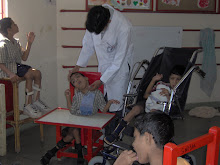There is a higher court than courts of justice and that is the court of conscience
Mahatma Gandhi
The Story so far...
In 2008 the United Nations Charter on the Rights of People with Disabilities came into being.The convention was an attempt to break from the traditional mold of viewing people with disability as instruments of charity and ensuring that people with Disabilities enjoy the same freedoms and human rights as all individuals. The charter. The fact that 88 nations ratified the the convention on the opening day made this the fastest human rights convention to be adopted by the UN.
One can argue that the convention by itself is nothing new. It merely ratifies what should be evident to any decent human being - that disabled people enjoy the same rights as others. Countries that ratified the convention (including India) are obligated to enact legislation to enforce the articles of the convention.
In 2012 the Government of India passed The Rights of Persons with Disabilities Bill which is designed to do just that. The bill is made up of six parts Part I contains the rights and entitlements; Part II provides for powers, duties and responsibilities; Part III elaborates on regulatory and monitoring authorities; Part IV addresses grievance redressal; Part V deals with offences and penalties; and Part VI is miscellaneous segment which is followed by a schedule on the named list of disabilities which accompanies the generic definition.
Does this change anything?
The bill moves on from the existing people with disability (PWD) act of 1995 to include more "generic definitions" of disabilities. Thallasemia, Heamophila and Dwarfism; not included in the original act find mention in the new bill. But is this really the approach we want to take. Far from following the stated aim of the convention the bill seems to want to create newer "definitions". Furthermore, while the fifth part of the bill states out that discrimination of a person with disability (including by a health care professional who refuses to render care) is punishable by a fine or imprisonment or both, it is hard to see how this law can be enforced.
It is the duty of every health care professional to tend to someone in need. This said very often the reason that a person with disabilities is denied health care has very little to do with the attitude of the health-care provider. The bill states that discrimination on the part of a health care provider would be punishable. How can this be enforced when the system doesn't allow for punishment of the road services that do not allow a person with disability to reach a bus stop much less travel by a bus. Similarly the law states that an individual with disability has the same rights as individuals without. Does that mean that in areas where there is no medical facility for the general population then somehow the absence of health care to an individual with disability is acceptable. Lastly the creation of generic definitions makes the whole bill seem like an exercise in futility. Is a child with a congenital heart defect supposed to be considered perfectly "normal" because unlike heamophila and thallasemia it is not listed among the "Generic Definitions". Is it acceptable to deny health care to a "normal" child but acceptable to punish the denial of the same to a child with disability.
As dentists we have an obligation to render the best possible care to each of our patients. The list of plausible excuses to deny care to a person with special needs is a long and convincing one. "I am not competent enough to do so"; "the patient would be better off with a specialist", "I lack the necessary equipment to render effective care"... each of these arguments are effective, convincing and in many cases also true. I am quite certain that no legislation can prosecute a doctor who offers any one of these reasons. While the legal right to universal health care may be a great concept; the only way to enforce it is to see it as a moral obligation.
Mahatma Gandhi
The Story so far...
In 2008 the United Nations Charter on the Rights of People with Disabilities came into being.The convention was an attempt to break from the traditional mold of viewing people with disability as instruments of charity and ensuring that people with Disabilities enjoy the same freedoms and human rights as all individuals. The charter. The fact that 88 nations ratified the the convention on the opening day made this the fastest human rights convention to be adopted by the UN.
One can argue that the convention by itself is nothing new. It merely ratifies what should be evident to any decent human being - that disabled people enjoy the same rights as others. Countries that ratified the convention (including India) are obligated to enact legislation to enforce the articles of the convention.
In 2012 the Government of India passed The Rights of Persons with Disabilities Bill which is designed to do just that. The bill is made up of six parts Part I contains the rights and entitlements; Part II provides for powers, duties and responsibilities; Part III elaborates on regulatory and monitoring authorities; Part IV addresses grievance redressal; Part V deals with offences and penalties; and Part VI is miscellaneous segment which is followed by a schedule on the named list of disabilities which accompanies the generic definition.
Does this change anything?
The bill moves on from the existing people with disability (PWD) act of 1995 to include more "generic definitions" of disabilities. Thallasemia, Heamophila and Dwarfism; not included in the original act find mention in the new bill. But is this really the approach we want to take. Far from following the stated aim of the convention the bill seems to want to create newer "definitions". Furthermore, while the fifth part of the bill states out that discrimination of a person with disability (including by a health care professional who refuses to render care) is punishable by a fine or imprisonment or both, it is hard to see how this law can be enforced.
It is the duty of every health care professional to tend to someone in need. This said very often the reason that a person with disabilities is denied health care has very little to do with the attitude of the health-care provider. The bill states that discrimination on the part of a health care provider would be punishable. How can this be enforced when the system doesn't allow for punishment of the road services that do not allow a person with disability to reach a bus stop much less travel by a bus. Similarly the law states that an individual with disability has the same rights as individuals without. Does that mean that in areas where there is no medical facility for the general population then somehow the absence of health care to an individual with disability is acceptable. Lastly the creation of generic definitions makes the whole bill seem like an exercise in futility. Is a child with a congenital heart defect supposed to be considered perfectly "normal" because unlike heamophila and thallasemia it is not listed among the "Generic Definitions". Is it acceptable to deny health care to a "normal" child but acceptable to punish the denial of the same to a child with disability.
As dentists we have an obligation to render the best possible care to each of our patients. The list of plausible excuses to deny care to a person with special needs is a long and convincing one. "I am not competent enough to do so"; "the patient would be better off with a specialist", "I lack the necessary equipment to render effective care"... each of these arguments are effective, convincing and in many cases also true. I am quite certain that no legislation can prosecute a doctor who offers any one of these reasons. While the legal right to universal health care may be a great concept; the only way to enforce it is to see it as a moral obligation.








